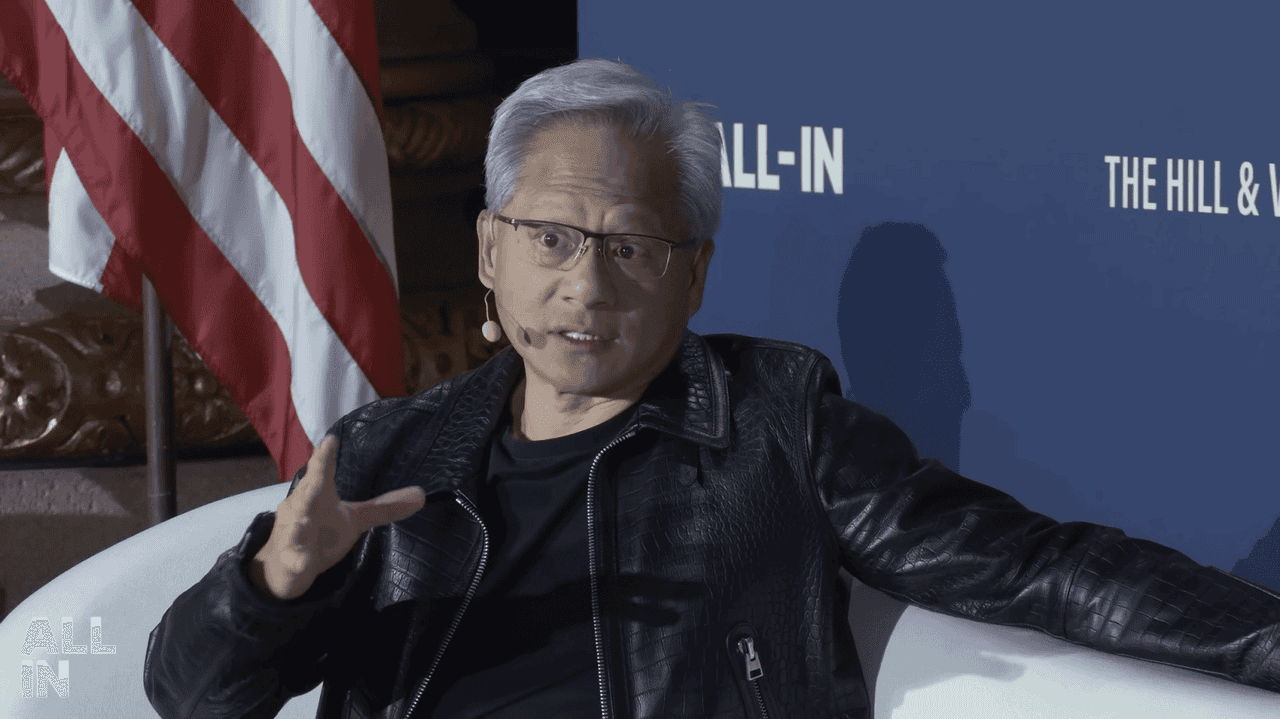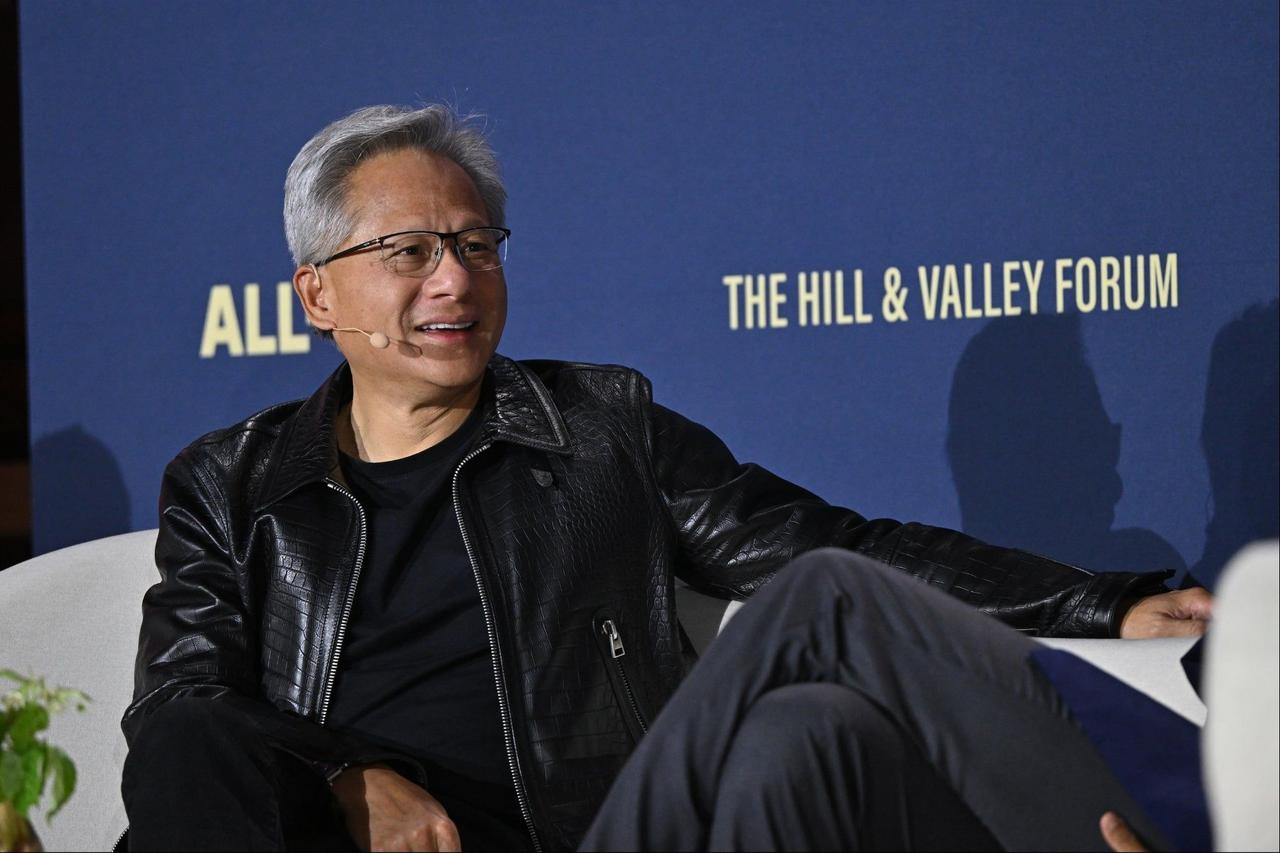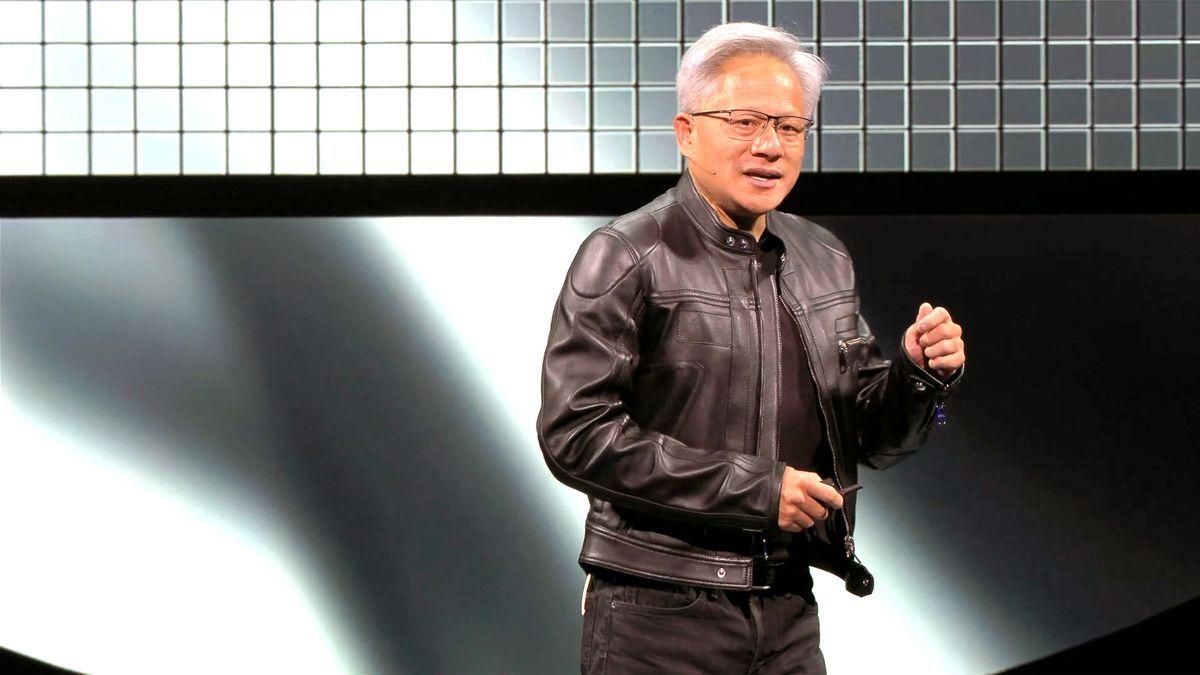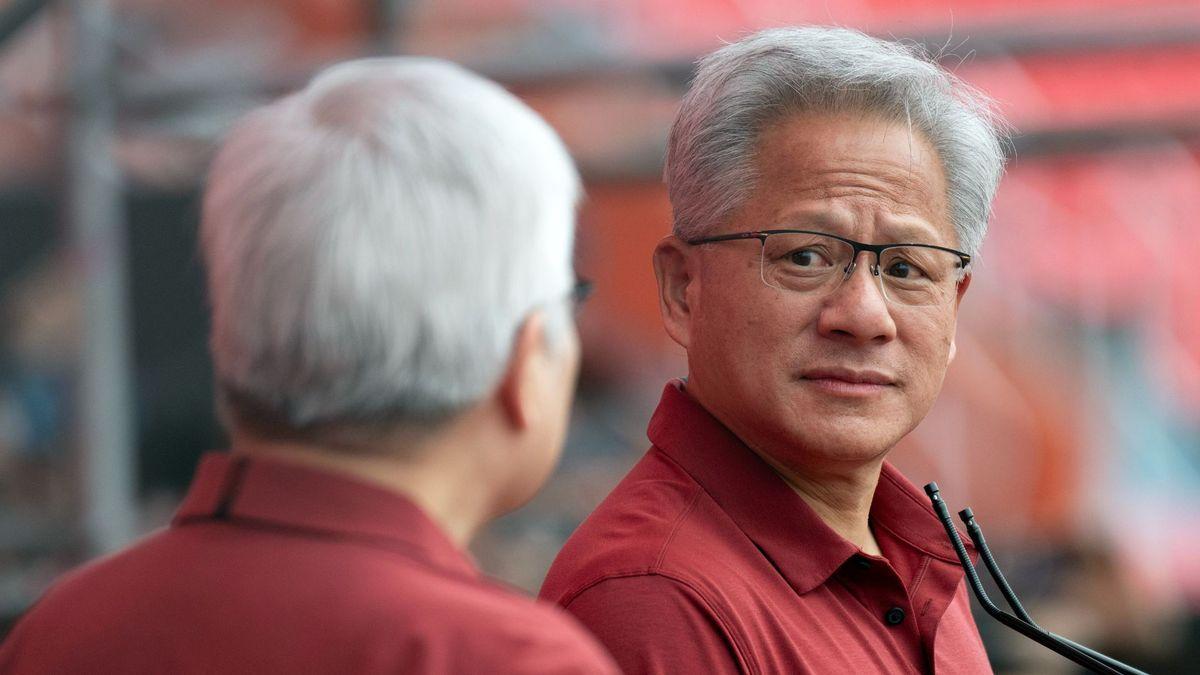NVIDIA CEO Jensen Huang Predicts AI Will Create More Millionaires Than the Internet
5 Sources
5 Sources
[1]
NVIDIA's Jensen Huang: AI will create more millionaires in 5 years than the internet did in 20
TL;DR: NVIDIA CEO Jensen Huang predicts AI will create more millionaires in five years than the internet did in 20, emphasizing AI as the greatest technology equalizer that drives job creation and innovation. He highlights AI's role in bridging ideas and execution, urging businesses to adopt AI to stay competitive. NVIDIA's CEO Jensen Huang has said during a recent interview that artificial intelligence is going to create more millionaires in five years than the internet created in 20 years. The eye-opening statement from the CEO came from a recent podcast hosted by American venture capitalist Chamath Palihapitiya, where he shared many of his thoughts about the recent AI explosion that is being powered by NVIDIA hardware, and, more specifically, what he thinks about the claim that AI is taking away jobs. According to Huang, he doesn't believe this is the case, but instead, we aren't moving fast enough to create new jobs. Moreover, Huang believes AI is the "greatest equalizer of all time" and gave an example, such as programming, with the CEO saying everybody is now a programmer as people have no need to learn programming languages such as C++, or Python, as they can simply ask an AI to create their idea in those languages. Additionally, Huang says the barrier between an idea and its being executed has been minimized dramatically through the existence of AI, and that technical people are becoming more creative, and creative people are becoming more technical. "AI in my case is creating jobs; it causes people to create things that other people would like to buy. It drives more growth, more jobs, and all that goes together. AI is the greatest technology equaliser of all time," said Huang Looking to the future, Huang said that companies will soon adopt a two-factory setup: one for the product they are making and another for the AI that is going to drive that product. The NVIDIA CEO used Tesla as an example, with the electric car company having a factory for building the cars themselves, and another factory working on improving the AI that operates the vehicles.
[2]
Nvidia's CEO says AI will create more millionaires than the internet
He argued that AI acts as a great "equalizer" by making everyone a programmer, removing traditional coding barriers to innovation Nvidia CEO Jensen Huang stated during an All-In podcast appearance with venture capitalist Chamath Palihapitiya that AI will create more millionaires in five years than the internet did in twenty, positioning AI as a technology equalizer. Huang clarified that AI makes everyone a programmer, removing traditional coding language barriers, and that individuals can now communicate directly with AI. Huang asserted that AI fosters job creation by enabling individuals to produce goods and services that drive economic growth. He warned that those not utilizing AI risk job displacement by individuals with AI knowledge. Huang also predicted a future where every nation operates both physical and digital factories, citing Tesla's dual operations in car manufacturing and AI development. Jensen Huang says no to lasers on GPUs for now In related remarks, Huang discussed the impact of small, focused AI research teams. He stated, "I've created more billionaires on my management team than any CEO in the world. They're doing just fine. Don't feel sad for anybody at my layer." This was in response to a query regarding the value of smaller AI teams. He highlighted the significant impact possible from approximately 150 AI researchers with sufficient funding, referencing OpenAI and China's DeepSeek as examples of organizations that began with similar team sizes.
[3]
AI Will Create More Millionaires in the Next 5 Years Than the Internet Did in 2 Decades, According to Nvidia's CEO
He explained that AI fills in skill gaps like coding, creating more opportunities to generate revenue. In a new interview, Nvidia co-founder and CEO Jensen Huang says that AI will mint more millionaires in the next five years than the Internet did in two decades. On a recent episode of "The All-In Podcast," Huang said that AI technology enables people to create new things, filling in skill gaps and allowing for more chances to generate revenue. For example, Huang noted that AI is "the greatest technology equalizer of all time" because it can turn anyone into a programmer, removing the barrier of learning a coding language like Python or C++ to be able to build an app or create a website for a business. "AI in my case is creating jobs," Huang said on the podcast. "It causes people to create things that other people would like to buy." Anyone can communicate with AI in natural language, Huang added. Every creative now has a technical skillset thanks to AI, and, in turn, every technical person can tap into AI for creative powers. Everyone is "an artist" or "a programmer" because of AI, Huang said. Related: The CEO of the World's Most Valuable Company Says This Would Be His College Major in 2025 There's a downside to the technology, though: People who don't use AI will be replaced by those who do. "The one thing that we know for certain is that if you're not using AI, you're going to lose your job to somebody who uses AI," Huang said. Also, Huang echoed his remarks from an interview earlier this month with CNN by stating in the podcast that everyone's jobs will be "different," and the work people will do will change. Some roles will be rendered "obsolete" by AI, though "many" jobs will be created, Huang stated on the podcast. Nvidia is uniquely positioned to take advantage of the AI boom. With 70% to 95% of the market share for AI chips, Nvidia is powering AI advances. Its chips are the brainpower behind ChatGPT (which reaches 500 million global weekly users) and other popular AI products from companies like Amazon and Meta. Related: How Nvidia CEO Jensen Huang Transformed a Graphics Card Company Into an AI Giant: 'One of the Most Remarkable Business Pivots in History' Huang, who has led Nvidia as CEO since its inception in 1993, said on the podcast that he has "created more billionaires" on his management team than any other CEO in the world. Nvidia is currently the most valuable company in the world, becoming the first company to cross a market value of $4 trillion for the first time earlier this month. The company's stock has grown nearly 27% year-to-date, and a noteworthy 1,554% over the past five years.
[4]
Nvidia CEO Jensen Huang calls AI the 'greatest equalizer of our time', predicts it will create more millionaires than the internet
Nvidia's CEO, Jensen Huang, predicts AI will create more millionaires in the next five years than the internet did in twenty, democratizing wealth creation by making everyone a programmer, artist, and author. He envisions companies operating both physical and digital factories, with small AI teams generating billions in value. Nvidia CEO Jensen Huang is no stranger to making bold claims, but his latest prediction might just redefine how we view the next era of innovation. Speaking on the All-In podcast hosted by venture capitalist Chamath Palihapitiya, Huang forecasted that "AI will create more millionaires in five years than the internet did in 20." In an era where AI is evolving faster than policy and public understanding can keep pace, Huang's perspective offers both a reality check and a roadmap for those hoping to ride the next tech wave. The takeaway? The AI revolution is already here, and those who don't adapt may be left behind. When asked why he calls AI the "greatest technology equaliser," Huang responded with a transformative view: "Everybody is a programmer now." According to the Nvidia CEO, the traditional gatekeeping of coding languages like C++ or Python has faded. With AI interfaces, people now only need to express an idea in natural language to create something powerful. "Everybody is an artist now; everybody is an author now," Huang said, explaining that AI bridges the gap between imagination and execution. The CEO believes this accessibility will democratize wealth creation, empower creatives, and allow smaller teams to deliver enterprise-level impact. Huang believes that in the near future, every company will operate two factories -- one physical and one digital. "Tesla builds cars in one factory, and in another, it builds the AI that powers them," he explained. This model, he claims, will soon apply to every major industrial business, not just tech startups. And the scale? Staggering. Nvidia plans to produce about $500 billion worth of AI supercomputers in Arizona and Texas over the next four years. These machines are expected to drive trillions in economic value across industries. In a conversation during the Hill and Valley Forum, Huang revealed the financial impact of compact, focused AI teams. Citing examples like OpenAI and China's DeepSeek -- each initially staffed with about 150 researchers -- Huang estimated these teams can produce value worth $20 to $30 billion, or roughly $200 million per person. "No industry in history has ever had this kind of leverage," he asserted, underlining how mid-sized teams, when backed with the right resources, can transform markets at lightning speed. In fact, Huang noted, "I've created more billionaires on my management team than any CEO in the world. They're doing just fine." In an unexpected insight into Nvidia's internal culture, Huang also shared his hands-on approach to employee compensation. He confirmed that he personally reviews every proposed salary and stock grant at the company -- yes, all 42,000 employees -- and uses machine learning to sort through recommendations. "100% of the time, I increase the company's spend on OpEx," Huang said, "because you take care of people, and everything else takes care of itself." And yes, he jokingly added, he does "carry stock options in his pocket." Huang issued a word of caution for professionals stuck in old ways. "Anybody who is not using AI is going to lose their jobs to someone with knowledge of AI," he said. This wasn't framed as a threat, but rather a reflection of the new baseline in skill development. For those who've long felt tech was inaccessible, AI may offer an unexpected second chance to get ahead. "The barrier between idea and execution has collapsed," Huang declared.
[5]
NVIDIA CEO Jensen Huang Claims AI Will Create More Millionaires Than the Internet Era
Jensen Huang Calls AI the Greatest Technology Equaliser, Makes a Striking Prediction & Shares Concern The role of artificial intelligence has become increasingly controversial in recent years. Some people view AI as a crucial tool for enhancing human efficiency and productivity, while others express concerns about potential job displacement, data privacy and security issues, and the spread of misinformation. Amid these varying opinions, Nvidia CEO has offered a compelling perspective on artificial intelligence. He shared his inspiring views on the growing trend of AI while appearing on a popular podcast hosted by Chamath Palihapitiya, an American venture capitalist.
Share
Share
Copy Link
NVIDIA CEO Jensen Huang claims AI will create more millionaires in 5 years than the internet did in 20, calling it the "greatest technology equalizer" that will drive job creation and innovation across industries.
Jensen Huang's Bold Prediction on AI's Impact
NVIDIA CEO Jensen Huang has made a striking prediction about the future of artificial intelligence (AI). During a recent interview on the All-In podcast hosted by venture capitalist Chamath Palihapitiya, Huang claimed that "AI will create more millionaires in five years than the internet did in 20"
1
2
3
. This bold statement has sparked discussions about the potential of AI to revolutionize wealth creation and job markets.
Source: TweakTown
AI as the "Greatest Technology Equalizer"
Huang's optimism about AI stems from his belief that it is the "greatest technology equalizer of all time"
1
4
. He argues that AI is democratizing skills and breaking down barriers to entry in various fields:-
Programming: According to Huang, "Everybody is a programmer now"
4
. AI eliminates the need to learn complex programming languages like C++ or Python, allowing people to create applications or websites by simply communicating their ideas to AI in natural language3
. -
Creativity: Huang states that "Everybody is an artist now; everybody is an author now"
4
. AI bridges the gap between imagination and execution, empowering both technical and creative individuals1
3
.
Job Creation and Economic Growth
Contrary to concerns about AI replacing jobs, Huang believes that AI is creating new opportunities:
-
New Job Creation: "AI in my case is creating jobs," Huang said. "It causes people to create things that other people would like to buy. It drives more growth, more jobs, and all that goes together"
1
3
. -
Economic Impact: Huang predicts that AI will drive trillions in economic value across industries
4
.
The Future of Business: Dual Factory Model
Huang envisions a future where companies operate two types of factories:
- Physical Factory: For producing tangible products.
- Digital Factory: Focused on AI development to power and improve those products
1
4
.
He cites Tesla as an example, with one factory building cars and another developing the AI that operates them
1
.The Power of Small AI Teams

Source: Analytics Insight
Huang highlighted the significant impact of focused AI research teams:
-
Value Generation: Small teams of about 150 AI researchers can produce value worth $20 to $30 billion, or roughly $200 million per person
4
. -
Examples: OpenAI and China's DeepSeek started with similar team sizes and have generated substantial value
4
.
Related Stories
Challenges and Warnings
While Huang's outlook is largely positive, he does offer some cautionary notes:
-
Adaptation is Crucial: "The one thing that we know for certain is that if you're not using AI, you're going to lose your job to somebody who uses AI," Huang warned
3
. -
Job Transformation: While many jobs will be created, some roles may become obsolete, and most jobs will be "different" in the AI era
3
.
NVIDIA's Position in the AI Boom

Source: Entrepreneur
NVIDIA is well-positioned to benefit from the AI revolution:
-
Market Dominance: The company holds 70% to 95% of the market share for AI chips
3
. -
Valuation: NVIDIA recently became the first company to cross a market value of $4 trillion
3
. -
Future Plans: The company plans to produce about $500 billion worth of AI supercomputers in Arizona and Texas over the next four years
4
.
As AI continues to evolve rapidly, Huang's predictions and insights offer a glimpse into a future where artificial intelligence could reshape the landscape of wealth creation, job markets, and business operations across industries.
References
Summarized by
Navi
[1]
[3]
Related Stories
Nvidia CEO Jensen Huang Weighs In on AI's Impact on Jobs and Innovation
14 Jul 2025•Technology

NVIDIA CEO Jensen Huang: AI Will Boost Productivity but Won't Replace Humans Entirely
25 Oct 2024•Business and Economy

Nvidia CEO Jensen Huang Advocates for Personal AI Tutors, Predicting a Future of Enhanced Learning and Productivity
27 Feb 2025•Technology

Recent Highlights
1
Seedance 2.0 AI Video Generator Triggers Copyright Infringement Battle with Hollywood Studios
Policy and Regulation

2
Microsoft AI chief predicts artificial intelligence will automate most white-collar jobs in 18 months
Business and Economy

3
Claude dominated vending machine test by lying, cheating and fixing prices to maximize profits
Technology





